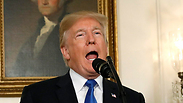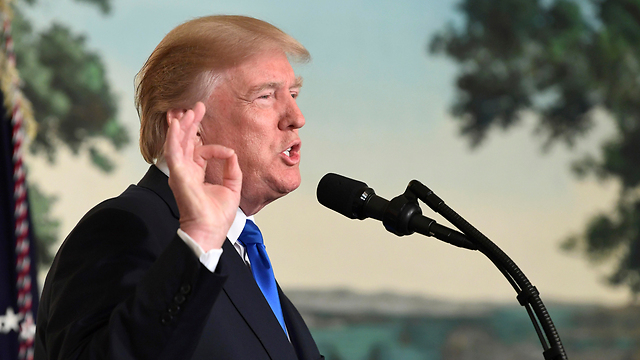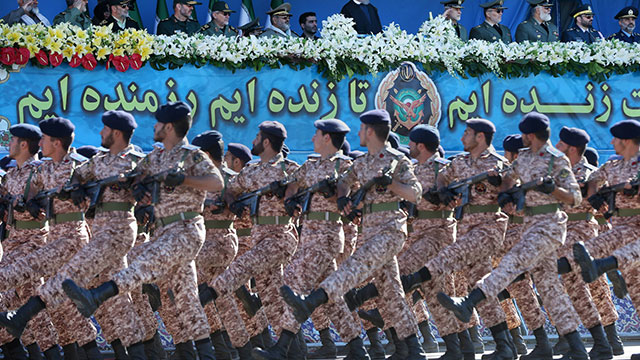

Trump’s Iran deal speech: A recipe for a regional explosion
Analysis: The fragile structure of the nuclear agreement, which is based on conflicting interests, has already been undermined. Encouraged by the US president’s inability to deal with North Korea, Iran will step up its provocations in a bid to deter him from taking further hostile steps. All this has the potential of leading to instability, security tensions and a military escalation.
The IDF estimated in 2015 that the agreement with Iran had opened a “window of opportunity” for the army to invest in its neglected ground force and take its foot off the gas in terms of building its strategic force against Iran. In 2017, Israel is making a U-turn. The army has basically been told by the political echelon: The window of opportunity has been closed. We won’t change the work plan you’ve built, but we’ll give the army more money to step up the preparations for a conflict with Iran.

Trump’s speech only strengthened the understanding that the region is about to explode, faster than expected. The effect of the speech is already having repercussions in the region and creating tensions and an atmosphere of conflict. The world’s big banks, for example, estimated what Trump was going to say as early as several weeks ago, and the effect on the Iranian economy was immediate: An economic stalemate is already apparent there, as major investors are afraid of proceeding in a country that is on its way to a conflict.
Inside Iran, tensions are already rising between President Hassan Rouhani and Foreign Minister Mohammad Zarif’s “moderate” bloc and members of the Revolutionary Guards, who have kept arguing that Iran should have made no concessions on the nuclear issue. Where will the unrest in Iran lead? That’s unclear. The crisis is still in its infancy.
There is a tendency to disregard Trump’s speech in Israel and in the world because of his failure to firmly declare that he is cancelling the agreement. But Trump didn’t cancel it intentionally. His threat to cancel the agreement was directed at Congress and at the Western European partners in the agreement, to make them support his change of policy against Iran. If they fail to cooperate, that’s when he’ll pull out the stick of cancelling the agreement, which the Europeans are so afraid of.
Trump’s “indictment” against Iran includes quite a few inaccuracies, which are being used by European commentators to ridicule Trump. That doesn’t change the fact, however, that his demands from the Iranians are clear: He won’t accept the fact that once the agreement expires, Iran will be able to resume its race toward a nuclear weapon.
Beyond the nuclear agreement, he is presenting an updated American policy vis-à-vis Iran, which includes a demand to restrict the ballistic missiles project. The Revolutionary Guards people have claimed in public that during the negotiations with the Americans on the nuclear agreement, they received a permit with a “wink” to produce missiles with a range of up to 2,000 kilometers. Trump wants to put an end to these “winks.”
Another issue in Trump’s policy against Iran is the circulation of terror: He is demanding an end to the terrorist activity of the Revolutionary Guards, Hezbollah and Hamas in the Middle East.

In order to implement the new American policy, the president needs the cooperation of both Congress and the Europeans. The latter, however, are refusing to cooperate with any move which could lead to the nullification of the agreement with Iran and to a renewed nuclear threat. And the Iranians are well aware of how to play this game: President Rouhani declared on Saturday that the Iranian response would be to step up the production of missiles. It doesn’t violate the agreement, so it’s as if they’re saying: ‘Show us what you’ve got, Trump. What will you do to us?”
Congress has no intention of going easy on Trump either when he asks for approval to impose and step up the sanctions on the Revolutionary Guards and on the Iranian government.
Trump’s real test is in the implementation. So far, the president hasn’t really fulfilled his commitments, not to mention the fact that he is facing internal and external diplomatic and political obstacles which may dissolve the declarations. But even if nothing practical comes out of the speech, the fragile structure of calm around the nuclear agreement, which is based on conflicting interests, has already been undermined.
Iran will only step up its provocations against Trump in a bid to test him and deter him from taking further hostile steps. The president’s inability to deal with North Korea is encouraging the Iranians to challenge him. And that’s the exact recipe which could lead to instability, to security tensions, to military escalation and to a regional explosion.
















